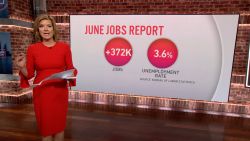It’s not unusual for two people with the same title to be paid somewhat different salaries. Pay, after all, is based on many factors, including a person’s experience and performance, the market rate for the position when they were hired and their negotiation skills.
But it’s hard to fathom that one person might make $150,000 more than the other.
Yet that’s the kind of differential that is popping up in some job ads that have posted since New York City’s pay transparency law took effect on November 1.
Organizations that do business in New York City and have at least four employees are now required to include in written job ads a “good faith” estimate of the minimum and maximum amounts they’d be willing to pay someone to fill the position.
While a random search online will turn up many job listings offering fairly narrow salary bands – a bank teller role, for instance, is advertised as paying between roughly $42,000 and $58,000 – some have bands so wide you could drive a truck through them. A vice president of human resources, for instance, is advertised as paying approximately $110,000 to $263,000. A news editor role pays between $50,000 and $180,000. A VP in marketing? Roughly $197,000 to $366,000.
The question is, why are these ranges so broad? The answer may differ from employer to employer since there is no uniform practice in how a company should set its minimum and maximum pay range. And the NYC Commission on Human Rights, which is the agency enforcing the new transparency law, does not offer guidance on how wide or narrow a range must be.
A very wide salary range in an ad may reflect cost-of-labor differences when a company is hiring for an open role in different cities but just posting one ad for all of them, said Jamie Kohn, HR research director at consulting firm Gartner. For example, the high end of the range could be for a candidate living in a high cost city like New York, but might not apply to a candidate living in Kansas City.
Or an employer might have five different levels of pay for someone with a title of manager, based on experience, said career expert Kimberly Brown, founder of leadership development company Manifest Yourself.
And some employers may be experimenting to see what works. “This is a new exercise for companies. … It could be seeing how far they can go with this,” said Kelly Cardin, an employment attorney at Ogletree Deakins
Whatever the reason, employers run a risk setting too wide of a pay range, especially if they don’t adequately explain why in the ad, Kohn said. She noted that candidates and employees are more likely to believe a company is fair if it posts narrower ranges. “You destroy trust … if you post too broad a salary range.”
Negotiating is still required
So are job hunters limited to asking for a salary that falls within the published range?
New York City’s pay transparency law doesn’t mandate that the actual offer a company makes to a candidate falls within the advertised range. That range simply represents to prospective employees a good faith estimate of what they can expect in salary, before counting variable compensation like signing bonuses, annual bonuses or equity.
“There’s nothing forcing employers to pay what’s within the range,” said Jose Rios Lua, the executive director of communications for the NYC Commission on Human Rights.
That means job candidates – and current employees who want to make more – still need to engage in salary negotiations, Brown said. “You should still negotiate always.”
She recommends continuing to research pay for a position by using online sites such as LinkedIn and Glassdoor, as well as tapping your professional network to get a better ballpark sense of what people in the role you seek are currently paid. And be very realistic about the experience you bring to a job, since that is a key element in setting pay.
If you happen to bring all the experience an employer is looking for and then some, you can negotiate for more than the top end of the advertised range, Brown suggested. “The max isn’t always the max.”



























